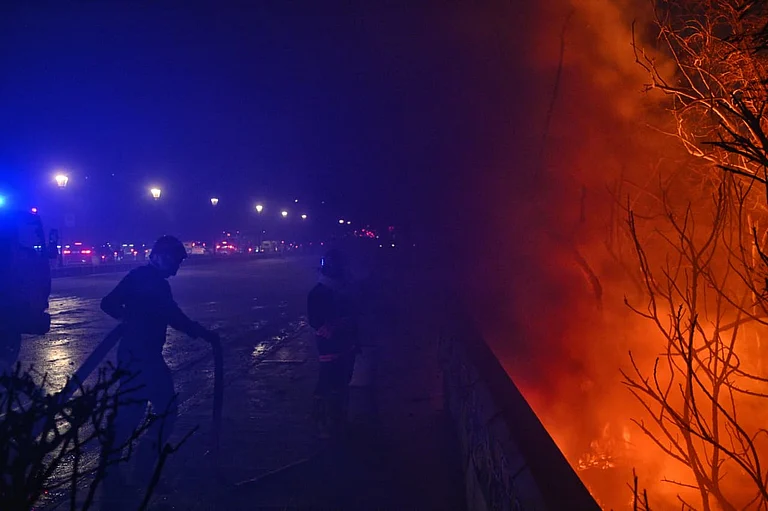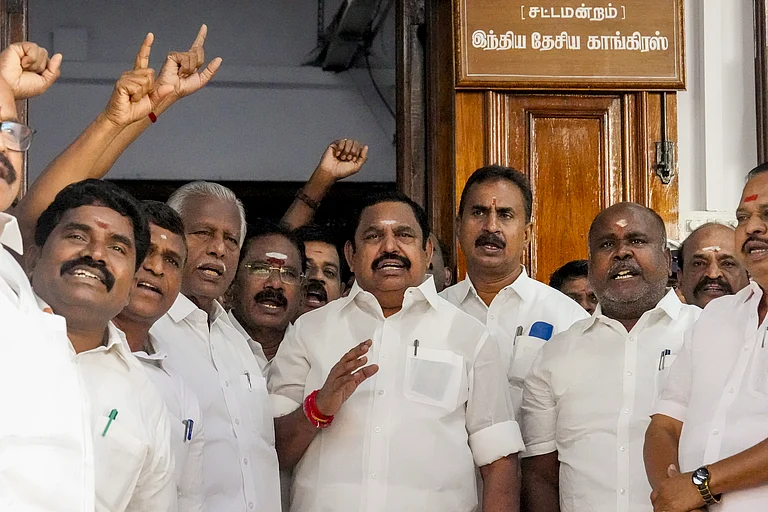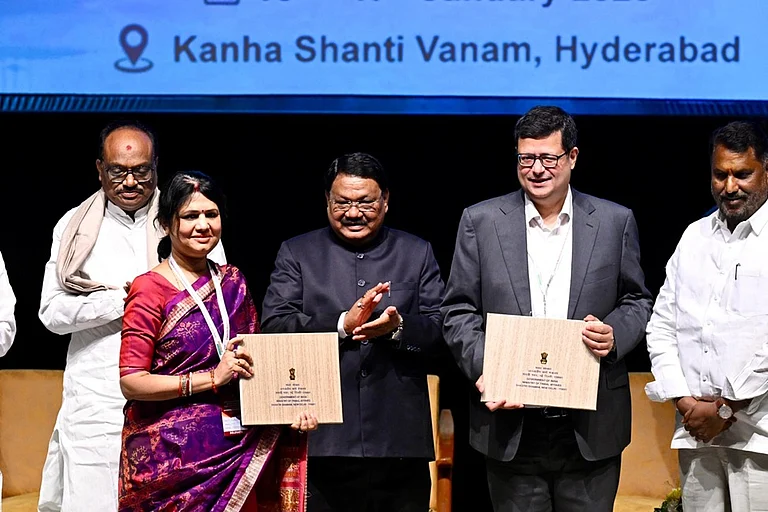The most vulnerable tribal groups in the country inhabit the resource-rich 'scheduled area' which constitutes 11.3 per cent of the total land area of the country. A Scheduled area is a designated area under the Fifth Schedule of the Constitution of India and is spread across 10 states namely Andhra Pradesh, Telangana, Odisha, Jharkhand, Chhattisgarh, Madhya Pradesh, Rajasthan, Gujarat, Maharashtra, and Himachal Pradesh.
The major threat to Adivasis is displacement, not only ‘project displacement’ (involuntary relocation from their habitat through land acquisition) but also resource displacement including land alienation, depletion of natural resources, erosion of hereditary rights over management of their places of worship, etc. The threat of displacement has further extended in recent times to the field of employment opportunities for tribal youth in the government sector.
The constitutional scheme designed to protect tribals under the Fifth Schedule of the Constitution has become feeble and failed to protect tribals from invasion and deprivation of their livelihood space by outsiders. It seems that the tribal protective legislative framework designed during British era was better than the existing constitutional scheme.
Before the framing of the Constitution, excluded areas were dealt with by Sections 91 and 92 of the Government of India Act, 1935. As per these provisions, no law of the Federal Legislature or the Provincial Legislature applied to an ‘excluded’ or a ‘partially excluded area’ unless the Governor, by public notification, so directs. The 1935 Act further conferred powers on the Governor to make regulations for the peace and good government of any area of excluded or partially excluded area.
The Government of India Act 1935 was repealed by Article 395 of the Constitution of India and instead provided Article 244 to extend the provisions of the Fifth Schedule covering the administration of Scheduled Area of the country.
The Governor has the power under Para 5(1) of the Fifth Schedule to exclude the operation of any law made by the central or the state by a notification to the Scheduled Area. If not, the laws of the parliament and legislature extend to such areas. Similarly, the Governor can extend a law with modifications. The Governor can also make regulations under Para 5(2) for peace and good government in the scheduled area with the consent of the President of India on the advice of the Tribes Advisory Council of the State.
The Supreme Court has delivered several verdicts in favour of tribals invoking the provisions of the Fifth Schedule to the Constitution protecting the interest of tribals.
For instance, the top court held that the Fifth Schedule has been designed to protect tribals from social injustice and exploitation in the case of Lingappa Pochanna vs. State of Maharashtra (1985).
The court also upheld the constitutional validity of the AP Schedule Area Land Transfer Regulations 1 of 70 promulgated by the Governor under the Fifth Schedule to the Constitution prohibiting the transfer of lands in favour of non-tribals in P. Rami Reddy &Ors. vs State of Andhra Pradesh &Anr. (1988). The SC held that “in the absence of protection, the economically stronger ‘non-tribals’ would, in course of time, devour all the available lands and wipe out the very identity of the tribals who cannot survive in the absence of the only source of livelihood they presently have”.
Further, the SC held that the constitutional scheme of the Fifth Schedule is to preserve tribal autonomy, culture, and economic empowerment, to ensure social, economic, and political justice, and for the preservation of peace and good governance in the Scheduled Areas in Samatha vs. State of Andhra Pradesh (1997).
The SC time and again has upheld the reservation made in excess of 50 per cent. For instance, the Court upheld 100 per cent reservation of the elected offices of ‘Sarpanch’ etc., under the Panchayat Raj system in “Scheduled Areas” in Union of India versus Rakesh Kumar reported in 2010.
However, the recent SC rulings appear to be in conflict with the interest of tribals in the scheduled area. Reservation policies concerning the tribals in the public employment sector in the scheduled area and the identity of tribals have particularly come to be questioned contrary to the intent of the Fifth Schedule, thereby pushing the poverty-stricken STs to the margins further.
In April 2022, a five-judge constitutional bench of the SC struck down a government order [GO Ms. No 3 of 2000 issued under 5(1) of the Fifth Schedule to the Constitution by the United Andhra Pradesh] providing 100 per cent reservation to the local ST candidates in the Scheduled Area, in ChebroluLeela Prasad Rao & Ors vs State of AP &Ors.
The SC ruled that the Governor’s power under Para 5(1) of the Fifth Schedule does not extend to subordinate legislation and cannot override the fundamental rights guaranteed under Part III of the Constitution. Further, the SC also warned the state governments of Telangana and Andhra not to attempt a similar exercise in the future providing reservations for tribals abridging its ruling.
This ruling has become a precedent to overturn the reservation rule made to benefit tribals in other States including Chhattisgarh and Jharkhand. The High Court of Chhattisgarh followed the ruling of SC in the Chebrolu Leela Prasad case in Nandakumar Gupta Vs State of Chhattisgarh, in May 2022 and further reinforced by the Supreme Court in a case held in Satyajit Kumar vs The State of Jharkhand in August, 2022. These rulings adversely impinge on the Governor’s powers under Para 5(1) of the Fifth Schedule and negate the space for justice through the Governor’s role as envisaged by the Constitution in matters influenced by the state legislature under the influence of non-tribal interests.
The SC dismissed the contention of a petitioner in a recent case that a non-tribal has no right to settle down in the Scheduled Area, is disentitled to exercise his right to vote in any constituency in the Scheduled Area, and that every constituency in the Scheduled Area should be declared as a reserved constituency for STs in For Social And Human ... vs Union of India in May 2023 in relation to the scheduled area of Odisha.
The SC observed that the Representation of People Act 1950 and the Delimitation Act 2002 apply to the Scheduled Area in the absence of any notification issued by the Governor withholding their application to the Scheduled Area under Para 5(1) of the Fifth Schedule. The SC further held that every citizen has the right to reside and settle in any part of the territory of India including the Scheduled Area under sub-clause (e) of Article 19 (1) of the Constitution of India.
Objection to this approach from tribal groups is rooted in the argument that it allows a non-tribal to become a resident of a scheduled area and compete with tribals of the area with regard to rights of representation which poses a serious threat to tribals' identity in their own area demarcated as scheduled area. The non-tribals gaining entry into scheduled areas and obtaining equal status at par with tribals is absurd and irrational especially when the tribals' demand for tribal status in scheduled areas of neighbouring states is denied by the state governments. For example, Chhattisgarh tribals, who are being pushed out by state-Maoist violence, are fighting for tribal status in neighbouring Telangana state.
Tribal groups wonder how a non-tribal who is prohibited from occupying the land situated in the scheduled area under tribal protective land transfer regulations can settle there and exercise his right to vote as a resident. The general concern of tribals is that non-tribals have become a game changer in the political domain, weakening the implementation of the rights ensured to tribals.
On the other hand, successive ruling parties at the centre have failed to strengthen the framework of the Fifth Schedule to the Constitution. The need to set up a Tribal Cell in the office of the Governor in the State to oversee the constitutional responsibilities in relation to Scheduled Areas and the STs has become a regular agenda item in the conferences of Governors since 2012. The High-Power Committee set up by the Government of India felt in its report in 2014 that the formation of a cell in all Fifth Schedule States is a long-standing necessity to protect the interests of STs to function independently and conscientiously. Barring a few states like Chhattisgarh, Jharkhand, Maharashtra, and Rajasthan, no other State has established a cell in Raj Bhavans.
Even the cells established in the referred states do not perform their minimum role of fulfilling the expectations of the Fifth Schedule. The Governors do not play any significant role in protecting the rights of tribals. The exception to this has been Maharashtra, and that too for a very brief period.
The Committee also felt that the annual administrative reports of the Governor under the Fifth Schedule do not offer an independent assessment of the policies of the State Governments except uncritically accepting the tall or baseless claims of the government with regard to tribal development.
In this background, political parties which are in the election fray have to clear their stand on the rights of tribals in the scheduled area concerning the reservation policies and constitutional framework under the Fifth Schedule of the Constitution before seeking votes of tribals.
Palla Trinadha Rao is a tribal rights activist and lawyer supporting the cause of tribals






















